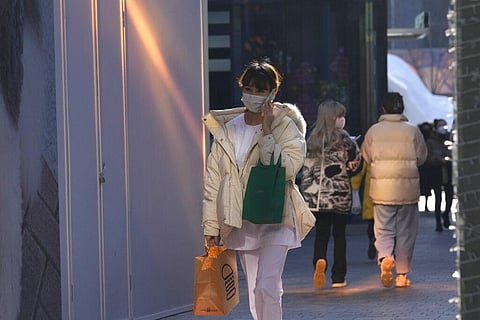

BEIJING: China has detected its second case of the omicron variant in a 67-year-old man who tested positive after more than two weeks of quarantine, official media reported Tuesday.
State broadcaster CCTV said the man returned from overseas on Nov.27 and underwent two weeks of isolation, during which he repeatedly tested negative for the virus.
On Saturday, he flew to the southern city of Guangzhou where he maintains a residence and began another week of self-quarantining at home.
A day later he underwent a routine test and early on Monday, the district health department informed authorities he had tested positive for the virus, the station reported.
Further investigation at the city and provincial level determined he was infected with omicron, it said.
On Monday, authorities announced the first case of omicron in a person who arrived on a flight from Europe earlier this month and tested positive on Thursday while in quarantine.
Poland's Health Ministry said Tuesday the traveller was a Polish teenager who flew from Warsaw to China.
Ministry spokesman Wojciech Andrusiewicz said the teenager, who traveled with her mother, was hospitalised in isolation.
She shows no symptoms of illness.
The teenager is in isolation in the northern port city of Tianjin, according to Chinese health authorities.
China has largely contained the spread of COVID-19 since it was first detected in the central city of Wuhan in late 2019.
Authorities credit a "zero tolerance" policy of strict testing, case tracing, quarantining and isolation for their success, with just 4,636 deaths from the virus officially recorded.
Singapore is bracing itself for an Omicron wave by boosting hospital and testing capacities to face the next COVID-19 surge even as plans for reopening of economic activities continue, according to a media report on Tuesday.
While the country has not detected any community transmission of the Omicron variant yet, it is only a matter of time before this happens, said Trade and Industry Minister Gan Kim Yong at a press conference on Tuesday.
"This may then lead to another surge in cases because of the highly infectious nature of the Omicron virus. We must, therefore, prepare ourselves for such a scenario," The Straits Times quoted Gan as saying.
Finance Minister Lawrence Wong has also cautioned that the highly transmissible Omicron variant could result in a potentially bigger wave of COVID-19 cases than the one caused by the Delta variant.
Vaccination-differentiated safe management measures will be expanded to more settings in the new year, as Singapore anticipates a potential surge in local Omicron cases.
To gear up for the next surge, Singapore is making plans to increase its intensive care unit (ICU) capacity to 500 beds, said director of medical services Kenneth Mak.
It is studying whether infrastructure upgrading needs to be done in public hospitals to support this, he added.
ICU bed capacity stood at around 280 beds in late October, at the peak of Singapore's Delta wave, with hospitals on standby to increase this to 350 beds if necessary.
In addition, the country is prepared to increase capacity in its community treatment facilities, so that hospital patients in stable condition can be transferred there if an Omicron wave hits.
Another 60 quick test centres, run by private operators, will be set up around Singapore to make COVID-19 testing more accessible.
And to help companies quickly detect Omicron cases, the government will continue to subsidise compulsory rostered routine testing in higher risk settings until the end of March next year, the report said.
The country is also pressing forward urgently with its booster vaccination programme and for more regular testing in the workplace and community, said the multi-ministry task force tackling the Covid-19 pandemic at a virtual press conference on Tuesday.
"As more Omicron cases are reported globally, it is a matter of time before the Omicron variant surfaces within our community," said the Ministry of Health (MOH).
Even smaller-sized events can spark transmission that can then spread to wider groups of people, especially in view of the Omicron variant, cautioned MOH.
Sixteen Omicron cases have been detected in Singapore to date, comprising 14 imported cases and two local cases who are airport passenger service staff, according to media reports here.
The variant has been found in more than 60 countries worldwide.
Tuesday's announcements on COVID-19 and Omicron variant included more measures to encourage vaccination and boosters to protect against infection and severe disease, alongside gradual and careful easing of measures for returning to offices.
Given the increased transmissibility of the new variant, vaccination-differentiated measures will be expanded to more places from February 1.
At the same time, more people will be able to return to their workplaces, given that 97 per cent of Singapore's workforce is now fully vaccinated.
From January 1, up to 50 per cent of those able to work from home will be allowed back in the office.
Working from home has been the default since September, when Singapore began seeing another rise in COVID-19 cases.
Social gatherings at the workplace will continue to be disallowed, to "minimise mingling and reduce infection risks", Gan said.
But the cap on participants at work-related events will be raised above the current limit of 50 people, if they remain masked and seated, at a safe distance from each other, MOH added.